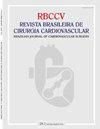颈动脉内膜切除术中动脉切开闭合技术的结果:牛心包补片闭合与初级闭合
IF 1.2
4区 医学
Q4 CARDIAC & CARDIOVASCULAR SYSTEMS
Revista Brasileira De Cirurgia Cardiovascular
Pub Date : 2022-06-08
DOI:10.21470/1678-9741-2020-0716
引用次数: 1
摘要
引言本研究的目的是比较颈动脉内膜切除术(CEA)后颈动脉的原发性闭合术(PRC)和斑块血管成形术(PAC)。方法对2005年1月至2020年6月接受CEA检查的患者资料进行档案复习。比较患者的人口学特征、手术信息和术后随访结果。结果在纳入研究的144例CEA病例中,PRC和PAC分别用于62例(43.7%)和82例(56.3%)患者的颈动脉闭塞。PRC组和PAC组的手术持续时间和颈动脉夹闭时间没有差异(分别为106.73±17.13分钟对110.48±20.67分钟,P=0.635;24.25±11.56分钟对25.19±8.99分钟,P=0.351)。术后呼吸障碍在PRC组更常见(P=0.012);然而,神经损伤(P=0.254)、手术伤口血肿(P=0.605)、手术部位感染(P=0.679)和死亡率(P=0.812)在两组之间没有显著差异。在平均26.13±19.32个月的患者随访时间内,PRC组的再狭窄比PAC组更常见(分别为26、41.9%和4、4.9%;P=0.003)。卒中频率(分别为4、2.8%和2、2.4%;P=0.679)、短暂性脑缺血发作(分别为2、1.4%和0、0%;P=0.431),和死亡率(分别为n=4,6.5%和n=4,4.9%;P=0.580)在PRC组和PAC组之间没有显著差异。结论PAC方法对CEA患者颈动脉闭塞是有效、安全的。本文章由计算机程序翻译,如有差异,请以英文原文为准。
Outcomes of Arteriotomy Closure Technique for Carotid Endarterectomy: Bovine Pericardial Patch Closure versus Primary Closure
Introduction The aim of our study was to compare the primary closure (PRC) and patch angioplasty closure (PAC) of carotid artery following carotid endarterectomy (CEA). Methods Data of patients who underwent CEA in the period from January 2005 to June 2020 were reviewed through files. Demographic characteristics, information about the operation, and postoperative follow-up outcomes of the patients were compared. Results Of the 144 CEA cases included in the study, PRC and PAC were applied to 62 (43.7%) and 82 (56.3%) patients, respectively, for the carotid artery closure. Duration of surgery and carotid artery clamping time were not different between the PRC and PAC groups (106.73±17.13 minutes vs. 110.48±20.67 minutes, P=0.635; 24.25±11.56 minutes vs. 25.19±8.99 minutes, P=0.351, respectively). Postoperative respiratory impairment was more common in the PRC group (P=0.012); however, nerve injuries (P=0.254), surgical wound hematomas (P=0.605), surgical site infections (P=0.679), and mortality (P=0.812) were not significantly different between the groups. During the mean patient follow-up time of 26.13±19.32 months, restenosis was more common in the PRC group than in the PAC group (n=26, 41.9% vs. n=4, 4.9%, respectively; P=0.003). Frequencies of stroke (n=4, 2.8% vs. n=2, 2.4%, respectively; P=0.679), transient ischemic attacks (n=2, 1.4% vs. n=0, 0%, respectively; P=0.431), and mortality (n=4, 6.5% vs. n=4, 4.9%, respectively; P=0.580) were not significantly different between the PRC and PAC groups. Conclusion We are of the opinion that the PAC method is effective and safe for carotid artery closure in patients undergoing CEA.
求助全文
通过发布文献求助,成功后即可免费获取论文全文。
去求助
来源期刊

Revista Brasileira De Cirurgia Cardiovascular
CARDIAC & CARDIOVASCULAR SYSTEMS-SURGERY
CiteScore
2.10
自引率
0.00%
发文量
176
审稿时长
20 weeks
期刊介绍:
Brazilian Journal of Cardiovascular Surgery (BJCVS) is the official journal of the Brazilian Society of Cardiovascular Surgery (SBCCV). BJCVS is a bimonthly, peer-reviewed scientific journal, with regular circulation since 1986.
BJCVS aims to record the scientific and innovation production in cardiovascular surgery and promote study, improvement and professional updating in the specialty. It has significant impact on cardiovascular surgery practice and related areas.
 求助内容:
求助内容: 应助结果提醒方式:
应助结果提醒方式:


